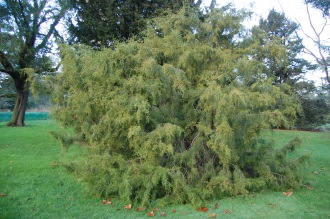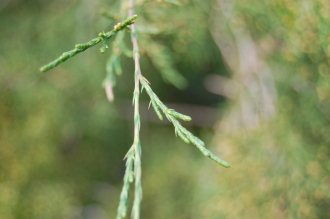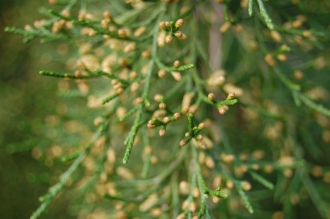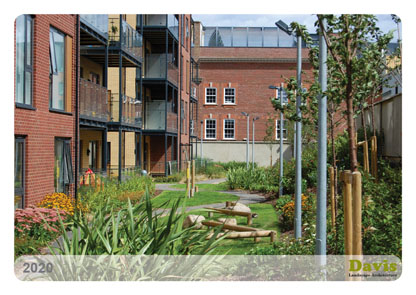Position: Full sun
Flowering period: Late winter
Soil: Moist, well drained
Eventual Height: 10m
Eventual Spread: 7m
Hardiness:7a, 7b, 8a, 8b, 9a, 9b, 10a, 10b
Family: Cupressaceae
Juniperus virginiana var. silicicola is a slow growing, long lived evergreen small tree or large shrub with a rounded, sprawling habit. Its mid blue/ grey leaves appear in two forms, juvenile and adult. Its juvenile leaves are sharp, needle like and up to 1cm long. Its adult leaves are scale like and up to 4mm long. Its trunk is short. Its red/ brown bark is fibrous and peels off in narrow strips. Its (usually) dioecious flowers are pollen cones are light brown, up to 3mm long, wind pollinated and are not self fertile. Its dark purple fruit are berry like seed cones and are up to 4mm across.
Juniperus virginiana var. silicicola, commonly known as Southern Red Cedar, is native to eastern North America. In its native habitat it grows in prairies, old pastures and limestone hills. Some people are allergic to the pollen of this tree.
The etymological root of the binomial name Juniperus is derived from the old Latin name for the Juniper tree. Virginiana is derived from the Latin meaning ‘from Virginia, USA’.
The landscape architect may find Juniperus virginiana var. silicicola useful as an attractive bushy evergreen tree. Once established this tree is drought tolerant.
Ecologically, Juniperus virginiana var. silicicola seed cones are attractive food for birds and mammals. Its structure provides shelter for birds.
Juniperus virginiana var. silicicola prefers moist, fertile, well-drained soils. It tolerates most pH of soil.
Juniperus virginiana var. silicicola requires little maintenance.







Leave a comment